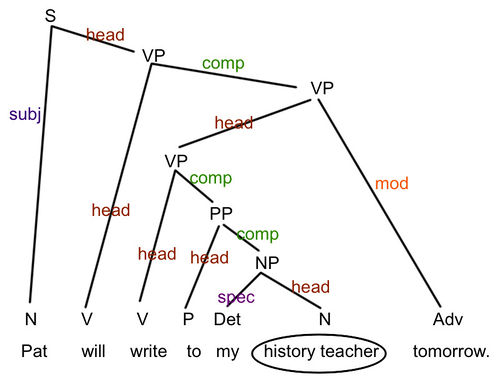Semantics 1, SoSe 2016 (Sailer)
Additional material for week 8
Basic syntactic notions
The following exercises are copied from the wiki page for exercises to chapter 3.
Feel free to send feedback on this exercise to Manfred Sailer.
Feel free to send feedback on this exercise to Manfred Sailer.
Six steps in a syntactic analysis
There is an old video on the 6 steps in syntactic analysis. The final analysis of the example sentence looks slightly different from what we assume in our class.
The tree we would draw in this class looks like this:
What are the differences?
Additional material for weeks 6 and 7
Quantifiers
Video introducing determiners into our logical language. (The video is based on the scenario of Romeo and Juliett.)
(copied from Wiki-ch2#Logical_determiners.2Fquantifiers)
Exercises
After having watched the video, work on the following tasks.
Task 1 Identify the determiners in the following sentence.
(a) Juliet talked to some stranger at the party.
(b) Every Capulet is an enemy to some Montague.
(c) Many people in Verona are not happy about the Capulet-Montague feud.
Check your solutions here:
(a) some
(b) every, some
(c) many
Task 2 Identify the formula that corresponds to the translation of the sentence.
Task 3 The sentence: Some Tybalt loved some Montague. is translated into the formula
∃ y (montague1(y) : love2(tybalt,y).
Given this table, is the overall formula true or false? (Give a reason for your answer.)
Check your solutions here:
The formula is false, because there is no individual in our model for which both the restrictor and the scope are true.
Task 4 Variable assignment function
Start with the following variable assigment function g:
g(u) = Romeo, g(v) = Juliet, g(w) = Romeo, g(x) = Laurence, g(y) = Mercutio, g(z) = Juliet
Provide the changed variable assignment function g[v/Paris].
Check your solutions here:
g[v/Paris](u) = g(u) = Romeo
g[v/Paris](v) = Paris
g[v/Paris](w) = g(w) = Romeo
g[v/Paris](x) = g(x) = Laurence
g[v/Paris](y) = g(y) = Mercutio
g[v/Paris](z) = g(z) = Juliet
Additional material for week 5
Additional material for week 5 can be found here.
Additional material for week 4
The material can be found on the page Semantics 1, SoSe 2016 (Sailer): Week 4
Additional material for week 3
The material for week 3 can be accessed here
